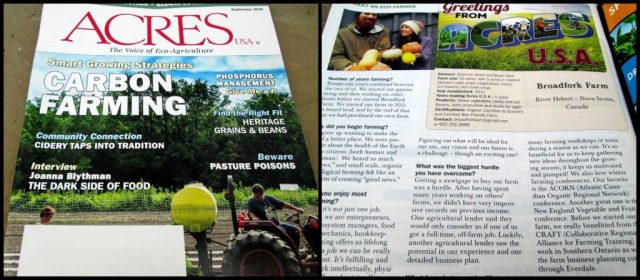
We were featured this year in Acres USA Magazine. In their section called Meet an Eco-Farmer. Here’s the interview:
Farm Name: Broadfork Farm
Farmers: Shannon Jones and Bryan Dyck
Location: River Hebert, Nova Scotia, Canada
Size: 15 acre farm, 5 acres in rotation between cash crops (vegetables, herbs, cut flowers) and cover crops. Only 1.5 acres in cash crops in any given year.
Established: We started our farm in 2011 on leased land, by the end of that year we had purchased our own farm.
Number of years farming: 21 years combined between the 2 of us. We started out apprenticing and then working on other farms before we started Broadfork Farm.
Years reading Acres U.S.A.: Since 2012 regularly, though we occasionally read it before then if the farm we were working on had a subscription.
Products: Mixed vegetables, herbs, cut flowers. We also do a bit of seed production and have just started raising ducks for eggs (we used to raise laying hens).
Certifications: Organic (certified by Ecocert) and Certified Bee Friendly Farm
Why did you begin farming?
We grew up wanting to make the world a better place. We were passionate about the health of the Earth and its citizens (both human and non-human). We heard so much “bad news” and small-scale, organic, agro-ecological farming felt like an active form of creating “good news.”
Have you always been an eco-farmer, or did you make a change?
Before starting our farm, we each apprenticed and worked on various farms. While each of these farms was very different, we have only ever worked on farms that were “ecological” or organic. Our own farm has always been an ecological and organic one.
What was the biggest hurdle you have overcome?
Getting a mortgage to buy our farm was a hurdle. After having spent many years working on others farms, we didn’t have very impressive records on “previous income.” One agricultural lender said they would only consider us if one of us got a full-time, off-farm job (which wasn’t our plan). Luckily, another agricultural lender saw the potential in our experience and our detailed business plan.
What do you enjoy most about farming?
I love that it’s not just one job. As farmers, we are entrepreneurs, retailers, ecosystem managers, food producers, mechanics, bookkeepers, etc. Farming offers us life-long learning and a job we can be really passionate about. It’s fulfilling and challenging work intellectually, physically, emotionally, and spiritually.
What is your biggest current challenge?
Making larger, permanent (expensive) infrastructure decisions. We have a vision for a winter storage, larger wash station, general storage, and potting-shed type facility. We’ve visited so many farms with great infrastructure and farmers who tell us what they like and don’t like about the structures they have. Figuring out what will be ideal for our site, our vision, and our future is a challenge (though an exciting one!).
What is the best piece of advice you ever received about farming?
That farming is a viable career option. That we can make a living as full-time farmers. I think hearing that it’s not possible is one of the biggest barriers for aspiring farmers that can prevent them from ever starting.
What learning opportunities have helped you become a better farmer?
Serving on Boards for farm and food-related organizations. Helping to guide an organization with other people who have different experiences and skill sets than we do gives us great perspective in the running of our own farm business. We strive to attend as many farming workshops or tours during a season as we can. It’s so beneficial for us to keep gathering new ideas throughout the growing season; it keeps us motivated and pumped! We also love winter farming conferences. Our favourite is the ACORN (Atlantic Canadian Organic Regional Network) conference. Another great one is the New England Fruit and Vegetable Growers conference. Before we started our farm, we really benefited from the CRAFT (Collaborative Regional Alliance for Farming Training) Network in Southern Ontario as well as the farm business planning course through Everdale.
What do you see in store for the future of sustainable farming?
We think that the majority of new farmers are going into sustainable farming (actually this is based on the results of the Canadian National New Farmer Coalition’s survey of new farmers from across Canada). We see this trend really strongly with other new and young farmers we meet. So, we are incredibly hopeful and optimistic about the future in general. Sustainable/ecological/organic farmers have been doing great work over the last few decades in really training the next generation. All of their great work and mentorship is really starting to pay off now and we’re so grateful to them for that!
What is your favorite season? Why?
Each season feels good when it comes up, but man, do we ever feel grateful for the winter season when it gets here! Having the time to figure out how to improve while sitting on the couch by the woodstove with a cat on our laps and hot tea in our hands is a real treat!
What do you enjoy most about living on the land?
Our farm is located in a really quiet and peaceful spot. We hear the stream running by, birds chirping, bees humming. The air is fresh, our water is good, and the plant life is lush. The stars are clear and bright at night. We do have a lot of blackflies and mosquitoes but I appreciate their role in our ecosystem too…and it’s not too much of a hardship wearing bug netting.






